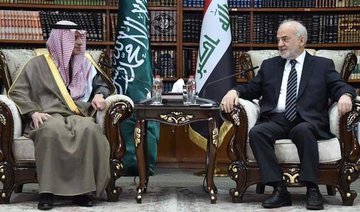WASHINGTON: A more aggressive and urgent tone in defeating Daesh and Al-Qaeda affiliates was prevalent Wednesday at US President Donald Trump’s first international coalition summit to counter extremism in Washington.
Secretary of State Rex Tillerson promised “interim zones of stability” — a lighter version of safe zones — and a more robust military strategy was discussed to roll back Daesh in Iraq and Syria.
The summit, which gathered 68 countries at the State Department in Washington, dealt extensively with “increasing coordination between the US and regional states,” State Department official Nathan Tek told Arab News.
More than 10 Arab delegations were at the seven-hour summit, including Saudi Foreign Minister Adel Al-Jubeir, UAE Minister of State for Foreign Affairs Anwar Gargash, and Hossam Zaki, assistant secretary-general of the League of Arab States.
More aggressive tone
While these summits were routinely held during the Obama administration, this one could produce a “more aggressive mechanism” in countering Daesh, said Tek.
In his opening statement, Tillerson said: “I recognize there are many pressing challenges in the Middle East, but defeating ISIS (Daesh) is the United States’ number-one goal in the region.”
For the first time, he spoke about establishing a form of safe zones that would allow the return of refugees, especially in Syria.
“The US will increase our pressure on ISIS (Daesh) and Al-Qaeda, and will work to establish interim zones of stability, through cease-fires, to allow refugees to return home,” said Tillerson. Tek did not elaborate on the specifics of such plans, but said the new strategy for the Trump team “is taking form, and all tools available at our disposal will be implemented to defeat Daesh.”
Going beyond Obama
Nicholas Heras, a fellow at the Center for a New American Security, told Arab News: “The Trump administration has already taken bold steps in this summit that go beyond the commitment of the Obama administration in Syria.”
Unlike Obama, “Trump sees an enduring American military role, on the ground in Syria, particularly in the areas that have been conquered from Daesh,” Heras said.
Tillerson’s statement on establishing some form of safe zones was “carefully worded and clearly had been the product of an interagency process that included the White House and National Security Council, the Department of Defense, the Department of State and other agencies,” added Heras.
“This means the Trump administration is investing in eastern Syria, after ISIS, in a manner that could develop into an American military mandate.”
Moving forward will entail “how to build up a stability force in eastern Syria out of local, mostly tribal militias that are now subordinate to Daesh,” said the expert.
This will most likely be done by utilizing “the Syrian Democratic Forces (SDF) coalition, and its adjutant force, the Syrian Arab Coalition (SAC), to conquer areas from Daesh and to construct local security structures to hold them.”
While the Trump administration has not laid out detailed plans on a possible US ground force to achieve this, Heras said its approach will “likely require the garrison of a couple of thousand US troops in a supporting role, probably based in north-eastern Syria, in areas controlled by the SDF/SAC.”
Regional diplomatic sources told Arab News that discussions are underway with Gulf and neighboring countries to Syria and Iraq about reconstruction efforts after the defeat of Daesh.
“The financial and military support of the GCC (Gulf Cooperation Council), particularly Saudi Arabia, the UAE and Jordan, are sought by the Trump team,” said Heras.
“The Trump team will want these close Arab regional partners to help provide financial incentives for the local population to buy into a post-Daesh future, and to provide military assistance that will relieve the need for an indefinite American military mandate in Syria that could be very unpopular to the American people.”
The summit was expected to conclude Wednesday with a final statement. Consultations will continue with regional partners on implementing its recommendations and initiating the preparatory work for the next meeting.














